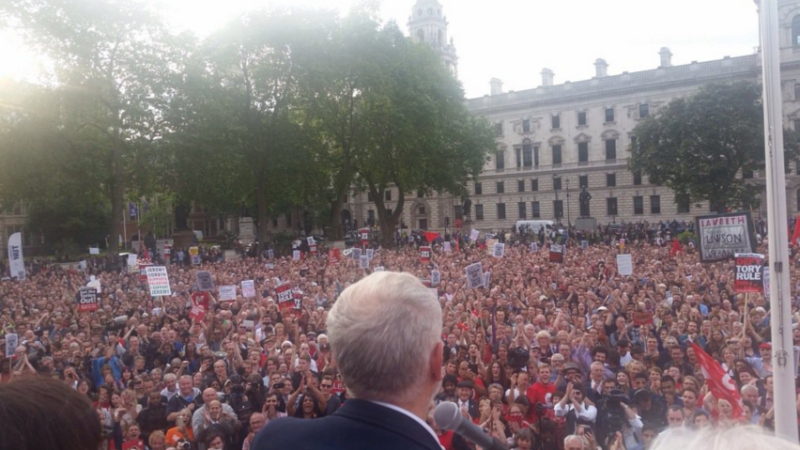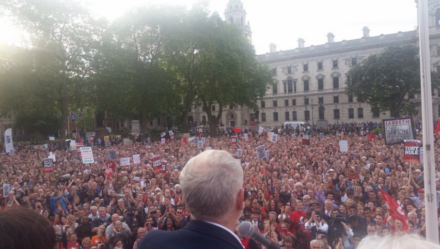

Yesterday we witnessed the newest stage of the Labour Party coup. First they thought they could publicly bully Jeremy into resigning. Then they thought they could defeat him in an honest leadership election. Finally, with no sign that Jeremy will give up nor that the membership will turn against him, they have resorted to even more underhand tactics. The bureaucracy teamed up with the Westminster corridor coupsters to rig the upcoming leadership election against Jeremy.
Their main goal – keeping Jeremy off the ballot – was thankfully thwarted. But some of the outcomes of the meeting are very worrying. And unsurprisingly, the decisions were reached in suspicious circumstances. Two rules have been introduced to govern the leadership election.
The first is a ‘freeze date’ on new members. This will mean that anyone who joined the party since January 12th will be unable to vote. This will cut out the 129,000 people who have joined during the fastest period of growth in the party’s history. It also reneges on the commitment on our website that members are “eligible to vote in leadership elections”. This might turn out to be a breach of legal contract.
The second rule change concerns ‘registered supporters’: quasi-members with the right to vote in leadership elections. Last year this status cost £3, this year the NEC have hiked the price to an eye-watering £25. For many, this is more than full party membership. It creates a two-tiered system for party democracy with one rule for those with money, and one rule for everyone else. If you joined the Party since January your vote has just been taken off you. Unless, of course, you can afford to buy it back.
How did this happen? What led to these exclusionary decisions?
Unlike the decision to have Jeremy put automatically on the ballot, which was the result of much discussion and deliberation, these proposals were rushed through at the end of an already over-running meeting. Fourteen votes were cast in favour – the same number as voted against Jeremy being on the ballot. These fourteen would have been a minority for much of the meeting. But the proposals were never on the agenda, and were only tabled after other committee members had left. Through these underhand means, the minority were able to push through their proposals.
This seems like gerrymandering. Jeremy’s opponents are trying to rig the election to get the result they desire. I am myself a candidate for election to the National Executive Committee and I am passionate about my politics. But I cannot imagine ever behaving like this to get my own way.
However, I am beginning to see how they have been being driven to this. It is beyond obvious that in a fair fight with Angela Eagle, Jeremy would be returned the resounding victor. This is not a criticism of Angela personally – she always comes across as a sincere politician – but of the wider politics behind her candidacy. Her launch event gave no indications of the political ideas and principles that motivate her, and no suggestions for the direction that she would take the party, much less any specific policies. This is no surprise: her politics, and those of much of the Parliamentary Labour Party, are dead and the dead don’t speak.
Centre-left parties across the Western world are at crisis point, either we adapt to the 21st century or we perish. Our political arena features forces which did not exist ten years ago: a hegemonic SNP, an insurgent UKIP, and widespread support for grassroots movements like those that Jeremy has dedicated his life to supporting. These forces are responses to globalisation, the changing nature of work, and the global financial crisis. Before Jeremy was elected, the Labour Party showed no sign of being able to respond to any of these. But now we are. Our party is growing, it is becoming embedded in social movements and it is reconnecting with the communities we represent. By contrast, Eagle’s leadership bid is politically empty because it has no answers to these questions. Given this, is it any surprise that it attracted so little interest from members, voters and commentators alike?
The undemocratic shenanigans on the NEC are the last cry of a dinosaur unable to adapt to a new world. These political forces are close to extinction so they have nothing to lose. They can break the rules, trash the party in public view, and drive the membership away. Anything is better than conceding control of the Labour Party to the new politics.
We now face a leadership election, only 10 months after the last. Members will have a genuine choice: the new politics of Jeremy Corbyn and the movement behind him, or the old politics of the Westminster bubble. But to those conspiring against democracy, I have one final question: if you do not have the confidence to face your own members, what hope do you have of convincing the electorate?




More from LabourList
Letters to the Editor – week ending 15th February 2026
‘Labour council candidates – it’s tough, but all is not lost’
‘Labour won’t stop the far right by changing leaders — only by proving what the left can deliver’